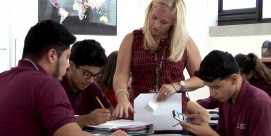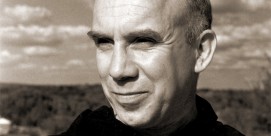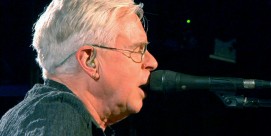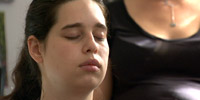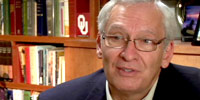In This Episode << SLIDE LEFT TO SEE ADDITIONAL SEGMENTS
Janet Cooper Nelson
Read more of Lucky Severson’s interview with the Rev. Janet Cooper Nelson, chaplain of Brown University in Providence, Rhode Island:
Q: You’ve been here 18 years. How do the students at Brown today compare with the students who were here when you first came to Brown? Are they the same?
A: They are both the same and different. They are the same in the sense that Brown has long attracted an entrepreneurial intellect, somebody with a lot of imagination, somebody who tends to be engaged, and that’s still true. I would say these students have been raised with an unusually strong sense of responsibility, which tends to make them more conservative. They are less likely to just raise an issue and protest about it. They are more concerned about how you build structures, and how people get along, and what the complexities are of that.
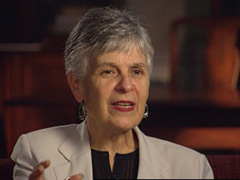
Rev. Janet Cooper Nelson |
Q: Why is that?
A: I think their world has done some falling apart. I think they are less secure about the fact that if they simply raise a concern in a strident way that there are institutions around them that can support that protest without their also being engaged in some kind of construction. But maybe it is because they are my children by age — my own son is 24. I watch, I think perhaps those of us who went through college in the ’60s and the ’70s had the attitude of the strident raise the voice, raise the protest. I’m not sure we appreciated what the construction piece was about. As we’ve gone along in our lives we’ve probably taught them that.
Q: Are students more interested in spirituality than in joining organized religion, as the surveys suggest?
A: I think that’s true. I also want to push back against some of those surveys just a little bit because I think one of the reasons those surveys are showing that is because surveys are finally being taken of these attitudes, and I’m not so sure that is a change as it is that we are noticing it. The Astin studies [by UCLA professor Alexander Astin] out in California didn’t used to ask these questions about spirituality. Once they started asking, they began to see numbers like 70 percent of the student body thought issues of spirituality were important issues.
Q: Why do you think college students are more interested in inner spirituality than in attending religious services or belonging to a church or synagogue?
A: I think that distinction is important, and I think it’s verifiable. If you took a group of Brown students and did what we call a forced choice exercise — go to one end of the room if you are religious, go to the other end of the room if you are spiritual — two-thirds of the students would be on the spiritual end. But if you asked people along the spectrum to speak about why they stood in the position they stood in, the kids on the religious end would say “I’m not so sure about whether you can be spiritual if you are not religious somehow,” and the students on the spiritual end would [say] the institutions of religion have failed, they seem coercive, they seem disingenuous, so we’ve gone to this end because the sacred content of life is still important, but we don’t really trust the institutional conveyance of that. And then we of course would bug them with, well, does that mean you don’t want to read the sacred literature? “Oh no, no, no, we think those are important.” I think there’s a new probing of the way people develop spiritually and religiously which is new to the academy. I think it’s new to the press. I think it’s somewhat new to the public, and I think it’s actually revealing some very interesting aspects about this generation which are truly different — not so different than when I arrived at Brown in 1990, because it was already underway. This generation is much more eclectic in its practice. We have students currently studying for the rabbinate who would tell you that the reason they are doing that is because they sat Zen while they were at Brown. Their grandparents probably wouldn’t have done that, and their grandparents might worry about whether that’s a legitimate way to arrive at rabbinical study. So we are seeing much more borrowing of practice across lines of tradition, and I think that’s a function of the invitation these universities have made to people from a variety of places in the world, cultures, languages, religions. Students become each other’s teachers.
Q: How can students who were teenagers at the time live through 9/11 and not have it affect them spiritually, not make them more vulnerable?
A: There I think you’re completely right. That’s what I meant to say with some strength earlier about the fact that they are very much more unsure of how the future will unfold. They feel as though there could be some great challenge to them personally, ethically, morally, and how will they be ready for that challenge? We don’t have to convince them that could be a question for them. They know it is a question already, and for many of them the resources they want to probe are the ones their families introduced them to by birth. They may have been raised and confirmed in traditions, but now as adults [they are] standing away from their families, but not in opposition [to] their families. That’s actually the piece I mean to point to. Students are much more likely to have rich and warm relationships with their families that they are continuing to develop. We see students far more religiously engaged than their parents.
Q: Are more of them more interested in service and in doing good works for others?
A: In [the chaplains and religious life] office we actually have a rabbinical colleague who is placed at our Center for Public Service. Our students, particularly the ones whose religious engagement and religious identity was more in the liberal world — Reform Jews, mainline Protestants, somewhat secular Catholics and Muslims — we found those students in record numbers engaged in all kinds of community engagement and service. They were building homes. They were responding to disasters. They were organizing tutoring. They were working literally in all kinds of relief occasions in the city. We felt it was very important for them to have somebody working with them who would help them reflect about those activities. Brown University has attracted people who want to ameliorate human wrong. The worth of life is not a topic that I have to raise with students. It’s one that they want to probe in their classes; they want to probe it in religious organizations. Whether I am teaching, whatever it is I’m doing, that is a question that captivates students here. I think it captivates this faculty. I think that’s a continuing passion here. People are really fired up here to do the good. They are not opposed to making money. I don’t mean to say we have saints who have come, and we are going to be totally unmaterialistic. We definitely have a business culture that’s percolating, but it feels to me that it’s percolating around how do we do the good and make a living?
Q: It seems like we’re going through a period of religious intolerance. Has that affected college students?
A; It has affected us. I mean, for instance, right after 9/11 we had students coming to the chaplain’s office saying I’m concerned about my woman friend who wears a hijab. How will it be for her here? Will she be okay passing through the airport in Rhode Island? Would it be appropriate for me to offer to travel with her? I want my friend who I don’t know so well to be safe. Well, why would you make such an offer except that you really thought there would be trouble for that person, or you had observed it? And we did what all universities did. We reached out to people and said we need you to tell us if you’re having trouble. But I think those moments have affected our students, and I think quietly they may well be nervous about each other’s beliefs, concerned about whether there is understanding sufficient in the world for there to be peace, awkward about asking questions they need answers to. So that’s actually at the core of what we’re trying to do.
I think students more determined to solve the problem than to exacerbate it — but they are affected by it and affected by the tension. We had a meeting with our Muslim students after a bit of a blowup over [free] expression here a year ago. They talked about what it was like to be at Brown, what it was like to be in the world, and I think many of the senior administrators who were there were deeply moved that these very young lives were having to navigate some pretty acidic commentary about Muslims generally and that many of those freedoms we talk about in America that we think everybody should take for granted were not theirs. They didn’t really feel that they could count on their safety, their freedom from harassment of a kind of garden variety.
Q: What about student interest in the environment and global warming?
A: Brown is an environmentally fired up place. We have environmentalists that come to that with a spiritual passion….When I was in college we used to frequently be confronted with the nuclear clock: How close was it to midnight? Was it three minutes? Was it five minutes? These students are likely to use those images in their papers. I was listening to someone tell me about a management book that’s just come out and it’s called “My Iceburg is Melting,” and it literally apparently uses a fictional piece about penguins having a meeting about their iceburg melting and how are they going to solve these problems, and this becomes a management tool at a Harvard Business School sort of place.
Q: Do you think involvement in issues like that increases their spirituality or their search for spirituality?
A: I think it exposes that deficit if they feel as though they aren’t grounded spiritually in something that may transcend their age or these problems. I hear students saying all the time, “My parents were — one person was this tradition and one person was that tradition, so we weren’t raised with anything. I have arrived at college, and I don’t know this world. I look at my friends who have a spiritual practice, and I really would like to have one.” But how do you go about doing that when you are 18? People my age thought that the best thing to do was to raise children without religious background and then let them choose when they were 18. In my mind that’s like raising children without table manners and then expecting that you can hand them a knife and fork and a napkin when they’re grown and they’ll know what to do with it.
I think religious literacy, some sort of way of approaching a set of issues, needs to be a part of a person’s formation. They will then decide as they move through their life, as you do, as I do, what does that mean in this moment? How do I appropriate that? Is it adequate? One of the things, of course, in the university we are endlessly trying to say is your spiritual tradition, the literatures of your tradition, have to be interrogated. Not all my clergy colleagues agree with me about that. Some people think nope, the Bible said it, I believe it, that’s all there is to it. We don’t subscribe to that theory, so we are actually taking a position with respect to religious texts and traditions that says they have to change. These students will be their leaders.
Q: What differences do you see in this group of students and those in the past, religiously and spiritually?
A: These students live historically in a different time. The context around them — as you’ve already pointed out they have seen 9/11. My son said to me on the phone the day of 9/11, “Remember how I said to you, Mom, our generation didn’t have a historically defining moment? Well, now we do.” He’s right about that. They do, and that does change everything for them. I don’t think it’s made them more religious. I think it may have made the whole world around them, as well as them, more conscious of spiritual questions and religious questions, which is probably why they are being surveyed more about it. The surveyors have noticed, too, and thought, maybe these kids are praying.
Q: Do they have a sense of vulnerability, of needing help from any source they can get?
A: I think there’s also a piece that’s contextually very different. When I was in college, and we laid out the newspaper at Wellesley, we did it with spray glue and a light table. When our Brown Daily Herald students lay out the daily newspaper, they do it on the Internet. They have a computerized system. Our students know so much more about Darfur, about what’s going on when a tsunami hits. They know more about whether there’s tolerance in China toward religious expression or there isn’t. They see the tragedy of Iraq unfolding in front of them, and I think they are asking themselves the question, what is it I am going to have to do about that, and how will I do that? We were beginning to have that knowledge in the ’60s and the ’70s, but their immersion in the world is far more nuanced than ours was because of what’s around them informationally. It doesn’t surprise me that they are worried.
Q: They are aware that we are a part of the world, and there’s no getting around that.
A: Those oceans on either side of the United States don’t separate us quite the way they used to. They’re spanned all the time electronically, and our students are wanting to propose to students around the globe that they work together on something, especially environmentally.
Q: Have scandals in religious institutions made them more skeptical and cynical?
A: I would say in the same way they look to Washington and see a thoroughly inadequate government system for responding to contemporary challenges, in many religious structures, especially Protestant Christian ones that have become very much a part of the popular and political culture, they see inadequacy. Then it means as a 20-year-old I’m not only confronted with sorting out my own beliefs, but I’ve actually got to think about what would the communitarian structure look like through which those beliefs could come integrity, because it’s clearly not that. But I don’t know if they’re faced with any different problem with respect to the governing structure that they live with in this country or many others. I think there’s a real sense of “we have much rebuilding to do and we need it while we are in college.” And we also say the word “leader” here a lot. Brown students are endlessly told — identified for their leadership, entrepreneurial qualities. I sometimes want to wrap my arms around them and say “You know what? Today you are off-duty. You don’t have to lead today,” because there is so much pressure on their shoulders. When the news comes on in the morning, and one of our homeless shelters is about to be closed, and the three people standing in the way of that are Brown students, I am very proud of them for being there, because I know that they wouldn’t even know to be there if they weren’t spending endless hours enmeshed in issues of homelessness and care for the homeless. But how many issues are there like that? They do need to say their prayers in the middle of the night to keep going with that kind of energy.
Q: Do you get the sense that their pastors and religious leaders are up to date or in tune with what’s really concerning them?
A: No, I don’t think their preachers and rabbis and priests are up to speed, and I’m actually on a tear to hope that we can find in this generation many new such folks among Brown students, around the university culture across the country, because one of the reasons our religious institutions have failed in this country is that they have not been able over the last 25, 30 years to draw into their leadership positions people of the very first rank. That sounds, I’m sure, elitist, but in my own denomination [United Church of Christ] we have commented about it, and I think that we are really reaping the whirlwind of that, when you look at the evolution discussion like we’ve seen in this country recently. These students have all studied science. Most of them have not, in secondary school or in college, had the kind of rich opportunity to study religion, philosophy, ethics and really think about those issues, and we need to bring those strands together or we are going to be faced with everything from stem cell decisions to genetic engineering to evolutionary questions to moral questions in this society, about whether there should or shouldn’t be torture. Can we really be facing that question — in America?
Q: You think religious institutions ought to be dealing more with issues like that?
A: I think they must deal with them. When they don’t, students then say that religion is inadequate, spirituality is where I belong, and they are right if religion is not about those issues that are framing the human life. That’s always been the province of what is a worthy life, and how would I live it and articulate it? So our students are actually taking themselves quite seriously and, I think, calling on the institutions that they will be a part of to be somewhat reflective of the kind of integrity and coherence that they are being taught in a university to acquire. It’s a tough standard.
Q: Do you find students questioning their own beliefs?
A: That question is our question. It’s not theirs. They are questioning their beliefs the way you did, the way I did, of course. But their purpose in questioning them is not to throw them out. Their purpose is to understand them better, to probe the foundations of those questions. My friend Scotty McLennan, who is my [chaplain] counterpart at Stanford, wrote a book a few years ago called “Finding Your Religion: When the Faith You Grew Up With Has Lost Its Meaning.” It’s a great title, but as I said to him, writing my review in the Harvard Divinity Bulletin — we both went to school there — I said has the science of your childhood held up? Has the math of your childhood held up? Why would the religion of your childhood work in your adult life? It doesn’t. It doesn’t have to be discontinuous, but it seems to me that what you are taught as a kid — where there’s thunder in the sky that’s God bowling — is not going to fly when you are 22. You are going to have probed the physics, you are going to know a little meteorology, and you are going to have moved along. I don’t think it’s about giving up something you were taught when you were a child. It’s about doing what grownups have always had to do, which is to reappropriate traditions now that they are past innocence. They know more. Sept. 11 is not just something your parents shield you from. It’s something where you think, my God, the guy I used to play football with was on the 86th floor of that building. That could have been me. What does this mean? Could my life end that quickly? What would it have been about? Is it worthy? That’s not a question most children are asking. And I don’t think it’s questioning in the sense of giving up. I think it’s about probing deeper and making sure that what it is you are laying claim to and articulating is something you can really stand by, live by, speak for.
Q: These students want religion to become more active in current affairs, in issues that affect the least among them, like the poor.
A: They absolutely do, and they are measuring religious institutions against the very articulated beliefs of those organizations. If a Christian organization is saying the measure of who we are is whether we fed the hungry, responded to the homeless, showed up when there was a war to do anything peace-making about that — and students said, “Look, you said all these things, you said Jesus said those things. You are not doing anything about that. In fact, none of those issues can come up.” In one segment of Protestant Christianity there’s been a real effort to bring about a certain social agenda through the church, and those congregations and those pastors and those traditions have become very mired in that. There’s actually an internal critique that’s been developing in that very movement. Randall Balmer at [Barnard] is probably the person I would look to there, because he is a card-carrying evangelical, and he really feels the evangelical church has thrown the baby out with the bath water by becoming so enmeshed in politics. I think the tension between how spirituality is sufficiently political and concerned with the amelioration of human wrong on behalf of the great spiritual traditions and yet not so enmeshed in lobbying specific political action, that in fact the pulpit becomes confused with the soap box — that’s a really tough tension, and it takes very wise leaders, smart leaders, careful leaders, thoughtful leaders, and they need to come from places like Brown. We need our rabbis to begin to come out of our best institutions. We need our pastors, our preachers, our monks, our nuns — they need to come from places where we’ve been really able to — I don’t mean just elite institutions can do that. I mean that we really need to be speaking to each generation about the need for it to produce exactly what those who founded Harvard College said: Pretty soon our leaders we brought from Europe are going to be moldering in the ground. We need a new generation of those leaders, so we founded a great university here. We need, in our great universities across the country, to keep calling forward the leaders of our traditions. In Islam, for instance, in the United States there isn’t a single institution yet where one can study to be an imam. The American Muslim experience is percolating. There are people coming from many different countries. They are settling in the U.S. for all of the promise that this offers. We need to create the educational institutions, and these students will be in the generation that will do that, as their Jewish forebears of the ’30s created the great Jewish educational institutions of this country. I think it’s a very exciting time, but it’s a serious time. We need our very, very brightest and most engaged or rooted students to do that, and we need to say that’s honorable. We’ve spoken to them about being politicians and doctors and lawyers and all those things. We haven’t talked to them so much about being religious leaders, and we need to do that. I think we are doing better at it. I think they are becoming each other’s teachers in important ways
I often feel like we open the door in the morning and get out of the way. [The students] are our teachers. I think one of the things we care most to model for them is a kind of collegiality not based on how erudite you are or how new you are to the question, because frequently the newest scholars have the most innovative, imaginative questions to ask, and we need to hear them. They are proposing syntheses among traditions that were not dreamed before. They come together around an issue like Burma overnight. My advisee from two years ago walked in the door and was the person organizing the entire campus on Darfur, led the university faculty in divesting our portfolio from Darfur. He’s a sophomore in the college. There’s a certain humility we all need about who’s smart around here. But I also think there is an extremely lovely blessing we’re receiving by looking over the shoulders of these students, seeing where their eyes are taking them for the things that need to be worked on and then trying to offer our tools, our history, our background in ways they can make better use of. I sometimes think we are surgical nurses or midwives in an operating theatre where the surgeons are very young, very skilled, but surprising for their precociousness in terms of where we need to go, and they’re not listening sometimes to all the old arguments about why you can’t go there. They’re there.

